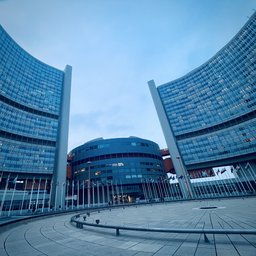So the WSIS+10 (the United Nations General Assembly’s ten-year review of the World Summit on the Information Society) is done. A process that has been the source of much fretting in Internet governance circles over the past few years has delivered its outcome. And the result? Actually it’s pretty good.
It's been ten years since the UN held a World Summit on the Information Society (WSIS) , two major meetings that produced the Tunis Agenda for the Information Society and the Internet Governance Forum.
A ten-year review was just completed in the form of a High-Level Meeting (in UN terms, one step down in importance from an actual “Summit”), which produced an Outcome Document . The Outcome Document was discussed, drafted and negotiated over the last six months, with final adoption by the General Assembly at the High-Level Meeting on 15-16 December 2015. Not only does this Outcome Document set the tone and approach for ongoing Internet-related UN activity, it was also an opportunity for the General Assembly to make specific recommendations on issues like the continuation of the Internet Governance Forum (which was one of the outcomes of the original WSIS meetings) and the UN’s level of involvement in Internet governance issues (including cybersecurity).
Got it? Good.
So looking at the final Outcome Document agreed by the High Level Meeting, the important points from a RIPE (and RIPE NCC) perspective are these:
- The Internet Governance Forum (IGF) has been renewed for a further ten years under the same Tunis Agenda remit (see paragraphs 72-78 of the Tunis Agenda ), with the provision that it "should continue to show progress on working modalities, and participation of relevant stakeholders from developing countries” (see para. 63 of the Outcome Document). So far, so good…
- After much debate around the words “multilateral” (generally read as “between governments”) and “multistakeholder”, the word “multilateral” appears only once, in a quote from the Tunis Agenda language about Internet governance being “multilateral, transparent and democratic” ( TA para. 29 ). But even this formulation has been expanded to recognise that "the management of the Internet as a global facility includes multilateral, transparent, democratic and multistakeholder processes” (see para. 57 of the Outcome Document). Another win.
- The UN’s Commission on Science and Technology for Development (CSTD) has been tasked with “re-booting” its Working Group on Enhanced Cooperation to continue the "dialogue and work on implementing enhanced cooperation” (see para. 65 of the Outcome Document). Given that the concept of “enhanced cooperation” has been a flashpoint for countless Internet governance-based conflicts over the past decade (particularly about whether new, government-based governance structures should be established), this was probably the best outcome possible, particularly given that the CSTD working group is to be based on the "full involvement of all relevant stakeholders taking into account all their diverse views and expertise”.
- The Outcome Document generally reiterates the WSIS focus on development of ICTs (including the role of information technologies in facilitating development more broadly, as in the context of the UN’s recently adopted Sustainable Development Goals). This means the focus is not on re-inventing Internet governance according to an untested, government-led model.
So the battle has been fought, the Internet lives on, we can all go home. Right?
If this outcome is a victory, then it’s a “defensive victory”, and defensive victories can seem unremarkable or be quickly forgotten - the status quo was threatened, the status quo survives, and life goes on unchanged. In the case of the WSIS review, it’s easy in hindsight to dismiss the fears that some had going into the process as overblown, simply because those fears didn’t come to pass. An event held simultaneously in the Chinese city of Wuzhen actually provided a timely reminder that Internet governance will continue to be contested territory. The 2015 World Internet Conference featured, among other speakers, leaders from China and Russia emphasising their hopes for the creation of new Internet governance institutions and greater respect for “national sovereignty” in Internet governance.
In that light, the WSIS+10 Outcome Document represents a significant achievement and those of us in the Internet technical community can rightfully claim some part of the credit for this victory. Understanding the role that we played, the efforts we undertook that were effective, and the processes at work is the key to continuing this success.
Since the original WSIS meetings, the RIPE NCC, along with other Internet technical organisations, has been working to build stronger connections with all Internet “stakeholder groups”, an in particular with governments, regulators and law enforcement. This has been in line with our understanding of the Tunis Agenda’s call for “enhanced cooperation” - an attempt to create an environment where different stakeholders can more effectively cooperate to meet Internet governance challenges.
While there were efforts on the part of various UN Member States to ensure that the development of the WSIS+10 Outcome Document included all stakeholder groups, in the final stages it boiled down to some old-fashioned state-to-state negotiation. Negotiation in the week before the High Level Meeting (including two marathon sessions that stretched on to 3am on the Thursday and Friday evenings) were open only to governments (and those on national delegations).
Given that this review of WSIS was explicitly being conducted by the UN General Assembly, this is perhaps not surprising; however, it highlights the importance of a general cross-stakeholder engagement strategy. In a “closed” environment like the WSIS review negotiations, it is governments that must make the case for a more open, multistakeholder approach to Internet governance - the more we, as the technical community, can do to inform their arguments in the months and years leading up to such negotiations, the better. Engaging governments, whether by encouraging them to participate in RIPE , inviting them to RIPE NCC Roundtable Meetings , or contributing to forums like the OECD or the ITU , has given us the opportunity to do just that. And the positive outcome of the WSIS+10 review is a direct result of that sort of “enhanced cooperation”.
Looking forward, the debate continues and the Internet ecosystem - technological, societal and regulatory - continues to evolve rapidly beneath our feet. Issues surrounding security continue to grow in importance, placing pressure on all stakeholders, including governments and regulators. Privacy, human rights and development will also remain in the spotlight, particularly as Internet technologies integrate themselves ever deeper into our lives. Defending the importance of a multistakeholder approach to all of these issues will not get any easier any time soon.
But as we kick off the New Year, it’s fair to look back at the WSIS+10 review as a job well done, and the basis for productive, cooperative efforts towards Internet development over the coming years…or perhaps just another bullet dodged!





Comments 2
The comments section is closed for articles published more than a year ago. If you'd like to inform us of any issues, please contact us.
Wilfried Woeber •
Thanks, Chris, for the concise report, and a loud "THANK YOU" to all the folks involved doing the necessary things for quite some time already! While reading this text I had a thought coming up in my old-fashioned techie-style head: it may even be useful to be challenged from time to time, to make sure "we" are not going to sleep, disregarding the ever-changing, "multi-stake-holder-ish" environment we are set in. Thumbs up, and let's see what may come next. Wilfried
Chris Buckridge •
Thanks Wilfried - agree that it's important for RIPE (and the technical community generally) not to be complacent about the more far-reaching effects of Internet technology (and the actions that other stakeholders are taking in response to those effects). There are few "political" Internet-related issues that don't, at some level, include a technical component (and vice versa!)